When Your Boss Doesn’t Know UK Leave Laws: How a Confident Employee Outsmarted HR Confusion
In today’s global workplace, not every manager is fully aligned with the local employment laws—and when misunderstandings arise, it’s often the employees who suffer the initial blow. But sometimes, a well-informed staff member can turn the tables with facts and policy on their side.
This story unfolds within a UK-based company, where an employee—let’s call them SML—took a routine 11 days of annual leave early in the year, well within their entitlement. A new overseas boss, apparently unfamiliar with UK annual leave entitlements, flagged the leave as “excessive” and escalated the issue to Human Resources (HR). What followed was a polite but powerful example of standing your ground. HR not only validated SML’s contractually agreed leave but, ironically, endorsed an extra few days off in the process. A further anecdote from another colleague reinforced just how out-of-touch the manager was with UK maternity leave rights as well.
Unfortunately, some bosses don’t understand the value of work-life balance and get upset when their staff go on vacation

An employee opened up about how taking paid time off resulted in her new boss reporting her to human resources
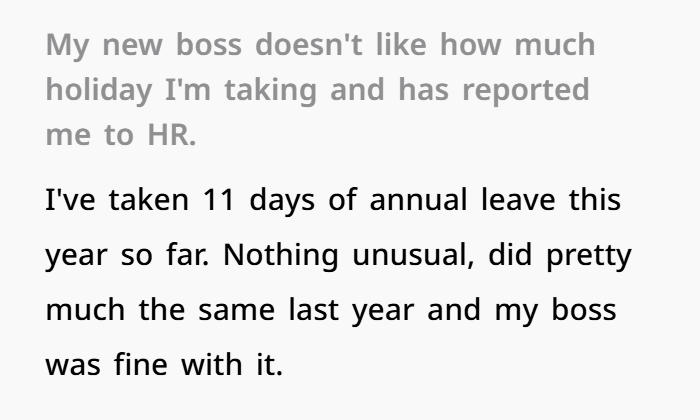



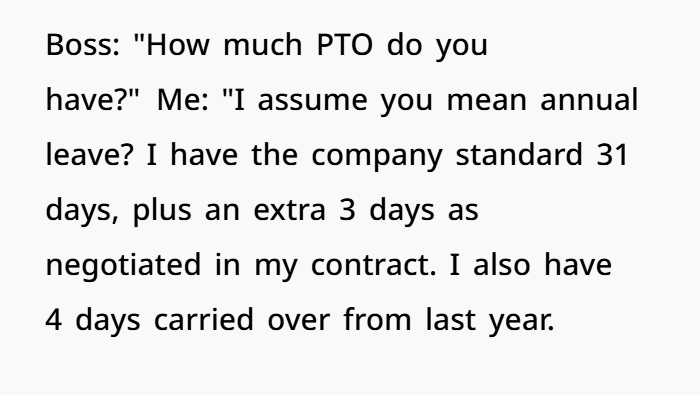
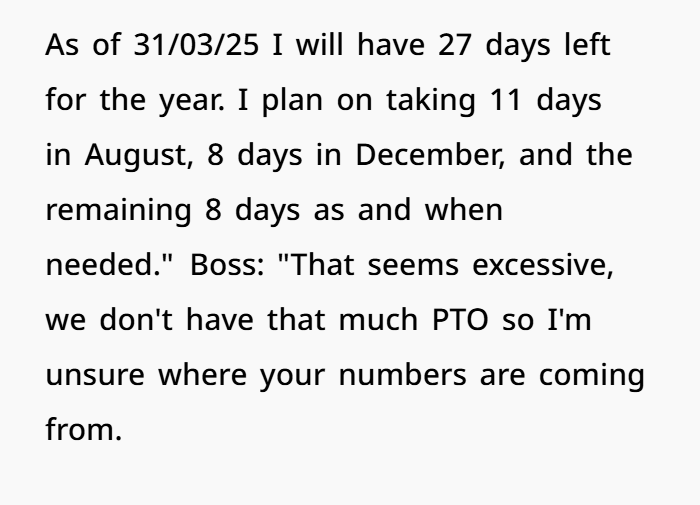
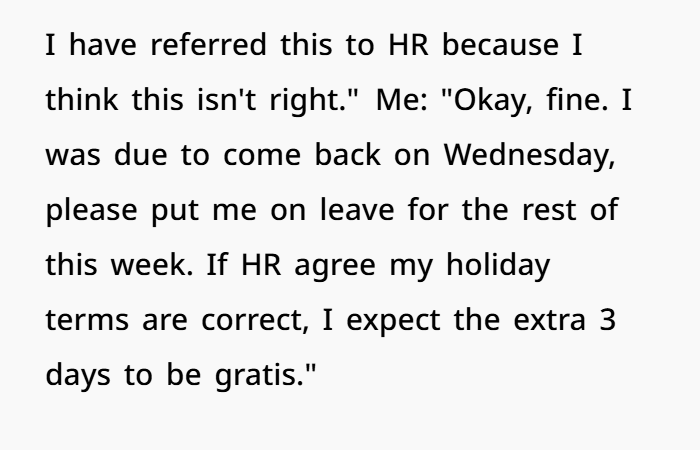
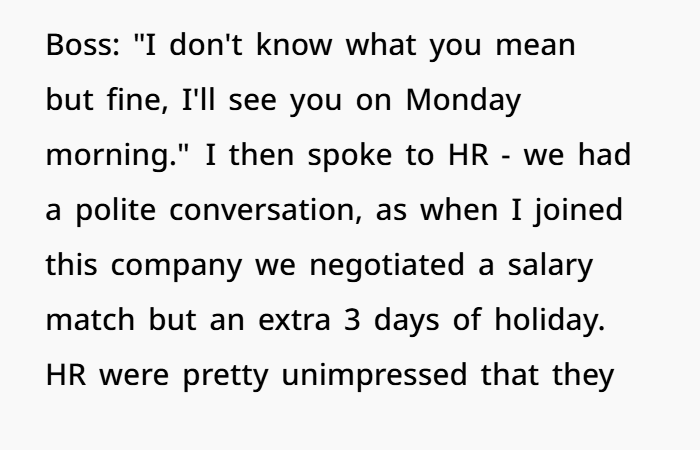
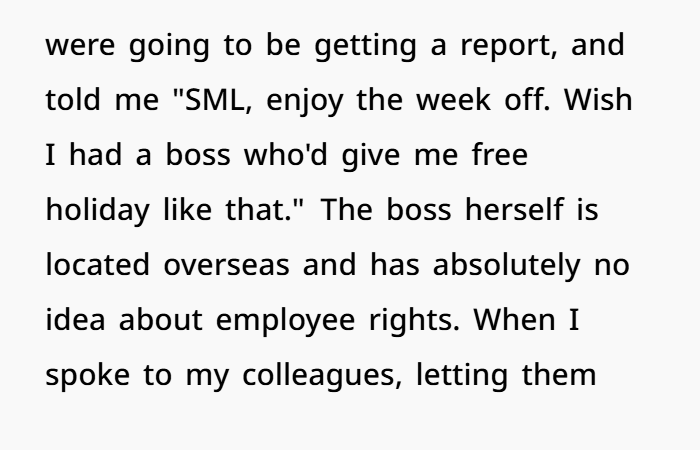
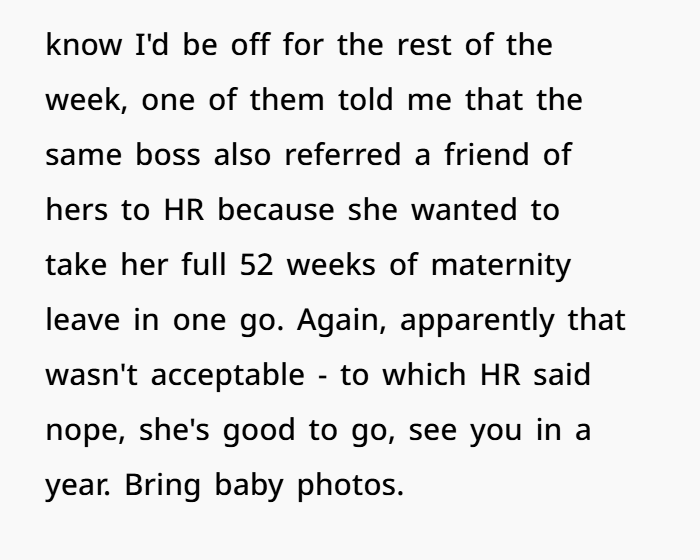
Navigating workplace policies regarding annual leave and maternity entitlements can be challenging, especially when management changes lead to differing interpretations of company policies. Your experiences highlight the importance of understanding and asserting your rights as an employee. Let’s delve into the specifics of UK employment law to shed light on your situation.
Annual Leave Entitlement
In the United Kingdom, the statutory annual leave entitlement for full-time employees is 5.6 weeks, equating to 28 days. This can include public holidays, depending on the employer’s policy. Employers have the discretion to offer additional leave beyond this statutory minimum, and such terms are typically outlined in your employment contract.

In your case, your contract stipulates 31 days of annual leave, with an additional 3 days negotiated separately, totaling 34 days. The carryover of 4 days from the previous year brings your total to 38 days for the current year. Your plan to take 11 days in August and 8 days in December, leaving 8 days for discretionary use, aligns with your contractual rights. It’s essential that any concerns raised by management about the “excessiveness” of this leave be addressed within the framework of your agreed-upon contract.
Maternity Leave Entitlement
Regarding your colleague’s situation, UK law provides robust protections for maternity leave. Eligible employees are entitled to up to 52 weeks of maternity leave, divided into 26 weeks of Ordinary Maternity Leave and 26 weeks of Additional Maternity Leave. Statutory Maternity Pay (SMP) is payable for up to 39 weeks:
- The first 6 weeks at 90% of average weekly earnings (AWE) before tax.
- The remaining 33 weeks at £184.03 or 90% of AWE (whichever is lower).
Employers cannot penalize employees for taking their full maternity leave entitlement. Any attempt to do so could be considered discriminatory and is subject to legal challenge. The recent introduction of the Neonatal Care (Leave and Pay) Act 2023 further supports parents by providing additional leave for those whose babies require neonatal care.
Addressing Management Concerns
It’s concerning when management appears unfamiliar with or dismissive of established employee rights. Such misunderstandings can lead to unnecessary conflicts and potential legal ramifications. Your proactive approach in communicating with HR was appropriate and ensured that your rights were upheld. It’s advisable to document all communications with management regarding such matters to protect yourself in case of future disputes.
Recommendations
- Know Your Rights: Familiarize yourself with your employment contract and the statutory rights provided under UK law. This knowledge empowers you to address any discrepancies confidently.
- Open Communication: Maintain clear and professional communication with your management and HR department. When misunderstandings arise, seek clarification promptly.
- Document Interactions: Keep records of all relevant communications, approvals, and policy documents. This documentation can be invaluable if disputes escalate.
- Seek Support When Needed: If internal resolutions are unsatisfactory, consider seeking advice from external bodies such as ACAS (Advisory, Conciliation and Arbitration Service) or a legal professional specializing in employment law.

Understanding and asserting your rights is crucial in maintaining a fair and respectful workplace. Your experiences underscore the importance of vigilance and proactive engagement in employment matters.
Later, the author shared a few more details about what happened, in the comments of her post







